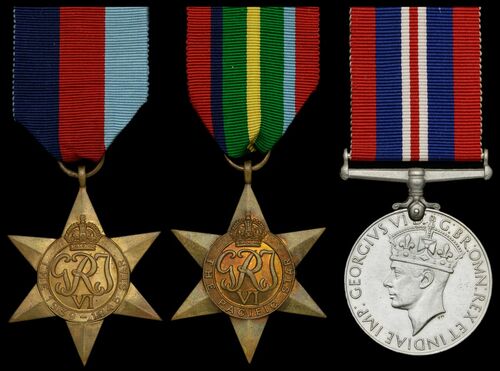
Auction: 23111 - Orders, Decorations and Medals - e-Auction
Lot: 828
A well-documented, 'Fall of Singapore 1942' Gunner J. Oldham, 148th (Bedfordshire Yeomanry) Field Regiment, Royal Artillery, who was lucky to survive forced labour on the Burma Railway
1939-45 Star; Pacific Star; War Medal 1939-45, with a large archive including named and addressed O.H.M.S. envelope and Soldier's Release Book, good very fine (3)
John Oldham was born on 1 July 1919 the son of Kate Annie Oldham and worked as a furniture salesman from his home at 47 Smith-Dorrien Road, Leicester prior to enlistment on 12 December 1939. Joining the 148th (Bedfordshire Yeomanry) with the service number 456437, he was posted to Malaya in October 1941, arriving at Singapore on 2 January 1942.
From the first things went poorly for the Regiment, when an air attack destroyed four of their 23-pounder guns. This did not stop them from putting up a good fight alongside a Regiment of the Gurkha Rifles, however once the Japanese cut the water supply the city fell. Oldham was taken along with the rest of the unit to work as forced labour on the Burma Railway.
Their first job involved clearing away the bodies that had piled up in the battle for the city and the massacres that followed. The Diary of another Gunner from the unit, Derek Gilbert refers to those dark months, stating:
'At Singapore station we were put into steel trucks – 36 men in each truck, standing room only. We travelled for 5 days with only one stop every 24 hours and given only boiled rice and water. Two of the men got dysentery and one died. We had one day of rest at Bangpong then had a 125-mile route march through the jungle during the monsoon. Those who fell sick were dragged into the jungle and shot.
At camp Wampo we started work on the railway, working for 16-17 hours a day. We had almost no food. My brother only lasted for 10 months in those conditions and died of beri-beri. We ate snakes and baboons and rats, grilled on sticks of bamboo like kebabs. I tied a lizard to my bed to eat the bugs but eventually I ate the lizard too. In a year the railway was completed but we spent another 18 months in the camp maintaining the railway, before we were moved to Ubon in North Thailand. Here we built a runway for the Japanese Air Force, before being made to dig an enormous pit. If the Japanese had been attacked we would have been shot and buried there.'
Oldham was not one of those taken to Thailand but instead found himself in at Camp No. 4, Taiwan. Upon his liberation he was taken to Canada until such a time as he could be found a space at a Civilian Resettlement Unit. Finally returning to Britain he was discharged 5 February 1946; sold together with copied research including P.O.W. lists and newspaper extracts as well as an impressive collection of original research comprising:
i)
A named and addressed O.H.M.S. envelope.
ii)
Soldier's Release Book.
iii)
Record of service and certificate of transfer to the Army Reserve.
iv)
Several extensions of leave, memoranda and travel passes.
v)
Pension information and forms.
vi)
Application forms for campaign awards.
vii)
A large collection of information, forms and memorabilia relating to the recipient's time in Canada.
viii)
Several photographs.
Subject to 20% VAT on Buyer’s Premium. For more information please view Terms and Conditions for Buyers.
Sold for
£400
Starting price
£80




